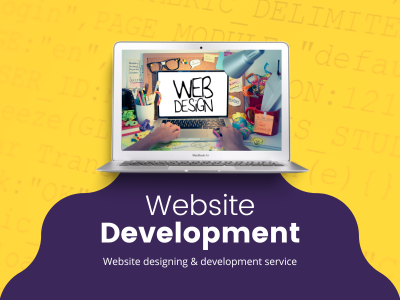In 2025, the digital landscape is more competitive than ever, and your website is often the first impression your audience gets of your brand. A well-designed, modern website is no longer a luxury—it’s a necessity. With new technologies shaping user expectations, businesses must adapt to stay relevant.
The Role of a Website in Business Growth
A website is your digital storefront, open 24/7 to potential customers around the globe. It builds trust and legitimacy, especially for smaller businesses trying to carve a niche. From e-commerce platforms to service providers, a website serves as a central hub to connect with customers, share updates, and generate leads.
The Impact of Emerging Trends on Web Development
Technology is evolving rapidly. In 2025, AI-driven personalization, voice search optimization, and mobile-first design are not just trends—they are essential elements of web development. Ignoring these can leave your business lagging behind, while early adopters reap the benefits of increased traffic and customer engagement.

Key Features of a Modern Website
Creating a website that stands out means integrating features that enhance both performance and user experience. Here are the must-haves for 2025:
Mobile Responsiveness
With mobile devices accounting for more than 60% of internet traffic, ensuring your website looks and works perfectly on all screen sizes is critical. Responsive design enhances user experience and boosts SEO rankings since search engines prioritize mobile-friendly sites.
Speed Optimization
Nobody likes a slow website. A delay of just a few seconds can cause visitors to leave. Tools like Google PageSpeed Insights and GTmetrix can help identify speed bottlenecks, ensuring your site runs efficiently, even during high-traffic periods.
Secure Infrastructure
Cybersecurity threats are on the rise, and users are more cautious about sharing personal data. Features like SSL certificates, firewalls, and secure payment gateways reassure visitors that their information is safe.
Types of Website Development Services
Different businesses require different types of web development expertise. Here’s a breakdown:
Front-End Development
This focuses on the visible parts of a website—how it looks and feels. Using tools like HTML, CSS, and JavaScript, front-end developers create visually appealing interfaces that engage users.
Back-End Development
The back-end is the backbone of your website, dealing with servers, databases, and application functionality. Technologies like Python, PHP, and Node.js are commonly used here to ensure everything runs smoothly.
Full-Stack Development
A combination of both front-end and back-end development, full-stack developers are highly versatile. They are ideal for startups or small businesses looking for comprehensive solutions without hiring separate specialists.
Latest Trends in Website Development for 2025
To remain competitive, embracing the latest trends is essential.
Artificial Intelligence and Chatbots
AI tools can analyze user behavior to provide personalized experiences. Chatbots, meanwhile, offer instant support, ensuring no visitor leaves without their questions answered.
Voice Search Optimization
With devices like Amazon Echo and Google Home becoming household staples, optimizing your website for voice queries is crucial. This involves using natural language and local SEO strategies.
Progressive Web Apps (PWAs)
PWAs combine the best aspects of mobile apps and websites. They are fast, reliable, and accessible without needing to download from an app store.

Choosing the Right Website Development Service
Selecting the perfect web development service can feel like finding a needle in a haystack, but it’s easier when you know what to look for.
Evaluating Your Business Needs
Start by defining your objectives. Are you building a brand-new e-commerce site or refreshing a corporate website? Understanding your goals will help you communicate effectively with developers. Don’t forget to consider your target audience—what features and functionality will resonate with them?
Comparing Development Agencies
Not all website development companies are created equal. Look for portfolios showcasing similar projects, read client reviews, and ensure the agency has experience in your industry. Pricing is another key factor—make sure it aligns with your budget without compromising quality.
Importance of Post-Development Support
A website isn’t a one-and-done deal. Regular updates, security patches, and performance monitoring are vital to keep your site relevant and functional. Ensure the agency you choose offers ongoing maintenance packages.
Benefits of Hiring Professional Website Developers
While DIY website builders are tempting, investing in professional developers offers a significant return on investment.
Expertise and Efficiency
Professional developers have a deep understanding of coding, design, and the latest technologies. Their expertise ensures your website is scalable, secure, and optimized for performance.
Time-Saving Advantages
Developing a website requires extensive time and effort, especially if you’re unfamiliar with coding. Hiring professionals frees up your time to focus on what you do best—running your business.
Tailored Solutions
Custom development ensures your website is unique and built specifically to meet your needs. Unlike generic templates, tailored websites offer flexibility and better branding opportunities.
Challenges in Website Development
Website development is not without its hurdles. Here’s how to tackle some common challenges.
Budget Constraints
Building a feature-rich website can be expensive, but careful planning can help you prioritize. Start with must-have features and gradually add extras as your budget allows.
Keeping Up with Technological Changes
The tech world evolves rapidly, and staying current can be challenging. Partnering with a tech-savvy agency or developer can help ensure your website remains modern.
Ensuring User-Centric Design
User experience is paramount. Avoid cluttered designs and complicated navigation. Instead, focus on simplicity, intuitive layouts, and accessibility to create a site that users love.
Cost of Website Development Services in 2025
Understanding the cost dynamics can help you make informed decisions.
Factors Influencing Costs
The complexity of your site, the features you want, and the development team’s expertise all impact costs. A basic informational website might cost less than $5,000, while a custom e-commerce platform could exceed $50,000.
Understanding Pricing Models
Developers typically offer two pricing models: fixed pricing and hourly rates. Fixed pricing works well for projects with a clear scope, while hourly rates are ideal for ongoing development or flexible projects.
Tips for Budget-Friendly Development
Negotiate wisely, and don’t shy away from requesting detailed quotes. Consider starting small and scaling your website over time. Open-source platforms like WordPress can also help reduce initial costs.
Tips for Maximizing Your Online Presence Post-Development
Once your website is live, your work is just beginning. Use these strategies to ensure it reaches its full potential.
Search Engine Optimization (SEO)
SEO ensures your website ranks well in search engines. Focus on using relevant keywords, optimizing meta tags, and creating quality backlinks to drive organic traffic.
Content Marketing Integration
A blog or resource section can position your brand as an industry leader. Regularly publish articles, videos, and infographics that address your audience’s pain points and interests.
Leveraging Social Media
Social media platforms are excellent tools for directing traffic to your site. Share engaging posts, use targeted ads, and encourage user interaction to boost your online presence.
Case Studies: Successful Website Transformations
Examples of successful transformations can inspire your own project.
E-Commerce Giants
Many e-commerce businesses have skyrocketed their sales through website redesigns. Improved navigation, faster load times, and AI-powered recommendations are just a few factors driving this success.
Small Business Success Stories
Local businesses are thriving online by creating user-friendly sites that highlight their unique offerings. For instance, small boutiques have leveraged visually stunning designs to attract global audiences.
Non-Profit Organizations
Websites are powerful tools for non-profits, helping them share their mission and collect donations. Modern, easy-to-navigate designs often lead to increased engagement and funding.

Future of Website Development Beyond 2025
What does the future hold for website development? Let’s take a glimpse beyond 2025.
The Role of Web 3.0
Web 3.0 introduces decentralization, blockchain technology, and enhanced user control. These innovations promise a more secure and personalized web experience.
Immersive Technologies
Virtual Reality (VR) and Augmented Reality (AR) are set to revolutionize user interaction. Imagine trying out furniture in your home virtually before making a purchase—it’s already happening!
The Continuous Shift to Sustainability
As awareness of environmental impact grows, green web hosting solutions are becoming more popular. These options minimize energy consumption and reduce carbon footprints.
Conclusion
Website development services are an essential investment for businesses looking to thrive in 2025 and beyond. From integrating cutting-edge features to crafting a user-friendly design, the right development approach can elevate your online presence and drive growth. Whether you’re a small business or a large enterprise, now is the time to future-proof your website and stand out in a competitive digital world.







